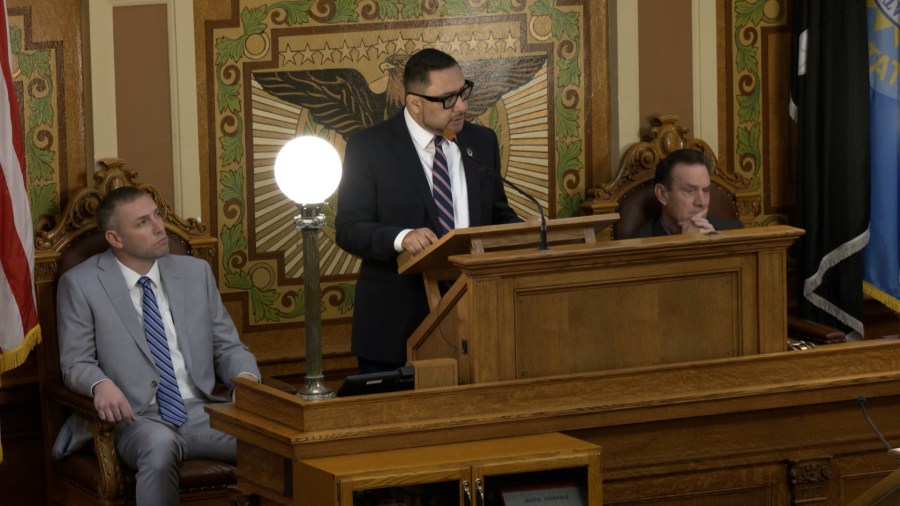PIERRE, SD (KELO) — The elected chairman of the Sisseton-Wahpeton Oyate used the State of the Tribes address to the South Dakota Legislature on Wednesday to call for a new chapter.
“Today, I want to speak from a tribal leader’s perspective on how we can build that future together,” Garrett Renville said.
“Though we might not agree on all issues, which is okay, but in the areas that we do, we must work to uplift those opportunities for future generations,” he said.
His next comment drew laughter from lawmakers. “If you think getting the Legislature to agree on something is tough, try organizing a tribal council meeting.”
“But here’s the truth,” Renville continued, “Whether in tribal council or this Legislature, progress is not about perfection. It’s about persistence, honest communication and partnership.”
Elected leaders from other tribal governments who had accompanied him into the House chamber sat at the front where House clerical staff normally work. As Renville spoke, House Speaker Jon Hansen sat to his right and Lt. Gov. Larry Rhoden to his left.
“Today, let’s re-set. Today, let’s rebuild. Today, let’s start to listen and actually hear,” Renville said.
Tribal areas comprise 12% of South Dakota’s land and enforcing laws is one of the greatest difficulties for tribes, according to Renville. He said the Crow Creek tribe has three officers, Lower Brule two, Yankton two, Rosebud 14 and Sisseton-Wahpeton 14.
Last year, however the Legislature passed a resolution brought by Republican Rep. Rocky Blare and Democratic Sen. Red Dawn Foster calling for the federal Bureau of Indian Affairs to establish a regional training academy in South Dakota, according to Renville, and last summer, state Attorney General Marty Jackley hosted the first tribal-oriented training academy, with nine tribal officers attending.
“Our hope is this becomes permanent and an official BIA academy,” Renville said.
He then turned to other ways state government and tribal governments can work together. Tribal governments want the Legislature to require the state Department of Revenue to report sales-tax revenue collected from online sales on tribal lands. “These revenues are not stated in compacts but have been promised to tribes after Wayfair,” he said, referring to the U.S. Supreme Court decision in South Dakota’s favor.
Renville also suggested amending state law to eliminate capital-gains tax on land that is returned to tribal interests for agriculture purposes. Regarding various proposal for payments to parents of K-12 students who don’t attend public schools, he asked that state government work with tribes to ensure that all students are being considered.
There also was a call from Renville that the state Office of Indian Education be returned to the state Department of Education where it began in 2009. A few years ago, Republican Gov. Kristi Noem transferred the office to the state Department of Tribal Relations. Renville also spoke about working with the Noem administration last year on healthcare and opportunities that exist there.
The new chapter, according to Renville, “begins with truth. Yes, there have been struggles, land disputes, policy disagreements, broken promises. But there have also been moments of cooperation, when neighbors came together to face challenges greater than any one group could solve alone. Let us learn from both, the struggles and the successes. Let us commit to listening, respecting, working together, not as adversaries, but as allies. Let us start to update our past.”
Renville asked lawmakers to support a resolution calling on Congress to remove the exile of the Dakota people from Minnesota by amending the Dakota Removal Act of 1863. South Dakota legislators refused to do so in the past.
“We are not looking for land or any other concessions,” Renville said. “We seek only to remove the exile language. This act is a source of great historical trauma to the Dakota people, and we must heal from that past if we are to evolve as healthy people in the future.”
Regarding the 2024 election results in South Dakota, Renville said tribal people supported the rejection by voters of SB201 regarding carbon-dioxide pipelines. He said the nine tribal governments oppose Dakota Access and Keystone XL oil pipelines as well as the carbon pipeline “period.”
Renville said it is time to re-set relationships.
“It is time to listen and hear each other. It is time we work for our citizens. It is time we begin to trust,” he said.
He concluded, “South Dakota’s strength lies not in our divisions, but in our diversity. We are richer because of the cultures, traditions and perspectives we share. When we work together, there’s not we cannot achieve.”


